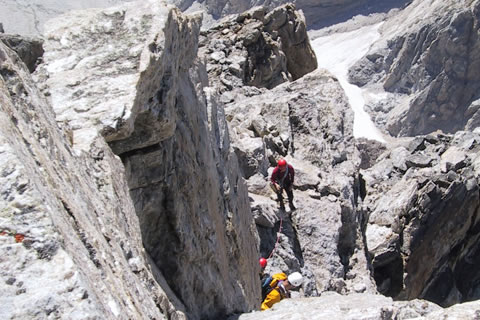| 294 | Risky Business | 2010-10-15 |

A year or so ago, a friend wrote and said he had a friend who was going to the Tetons and wanted to climb the Grand. Did I have any advice for him?
At first I wrote something sarcastic like - just keep going up until you can't find anything higher. But, then I changed my mind. Instead I wrote a dissertation on climbing the Grand. I did not emphasize the ease of the climbing, instead I focused the response on how hard the climb was.
My response was meant to plant a seed of caution to the would be alpinist. He had never climbed in the mountains and it seemed to me, as if he was approaching the climb much like he would a local rock climb. Exum Ridge is not just a rock climb. I advised that the climber's basic rock climbing skills would hardly be tested on the route; but his mountaineering skills would be pushed to the limit. The problem was, he had no mountaineering experience.
The man mostly laughed at my lengthy response. He drove to Wyoming, climbed the Grand - the next day, and then drove home. I was happy for his success.
The climber was an experienced rock climber and was able to climb the route with ease. But, the main reason for his success was just plain luck. If my memory serves me... he got off route, never found the route, wandered around, and finally made it to the summit and most importantly he had good weather throughout the day. Many parties through the years, who have experienced the same route finding difficulties, have not had that perfect weather day and were not as lucky. Their inexperience brought them fear, misery, rescue, and/or worse.
The mountains can be cruel. Safely traveling the mountain routes takes a special skill set, one that is acquired through years of being in the mountains.
Should I have just stayed with my initial response to the would be Grand climber? Giving advice is a risky business. The advisor wants to encourage the climber, you can do it - rah, rah; but, the advisor must also encourage the climber to first gain experience.
A mountaineering route is not a sport climb. If it rains, the mountain climbers cannot pick up their gear and walk twenty feet to their vehicles. When the rain changes to hail and electricity fills the skies, they are still on the mountain. Their survival depends to a large part on their mountaineering skills. So, what advise should you give? Just go climbing on pretty days?
Clothing and gear has made climbing easier for the masses. And the masses have responded by escaping to the mountains in hoards. Climbers seem to be bent more toward how easy a climb is, rather than how hard it is. Maybe, it is just a hold over from the rock climbing sandbag ratings - rating things easier than they really are. When Amy and I climbed the 54, 14,000 foot peaks in Colorado last summer, we increased our skill and comfort level with each peak we climbed. Though, each peak was still hard - in it's own way. We could see how each route, given the right conditions, could even be deadly. When the inexperienced masses meet the mountains in any but the best conditions, serious mountain incidents are likely to occur. Better clothing and gear make the mountains easier to experience but does not make the climber more experienced. Experience qualifies a climber to be a mountaineer, not cheerleading.
When giving advise, other than telling the climber to go up, the advisor should emphasize experience. The experienced climber does not have to ask if they can do a route, they will know; after all, they have paid their dues and are experienced.
Happy risky trails.
